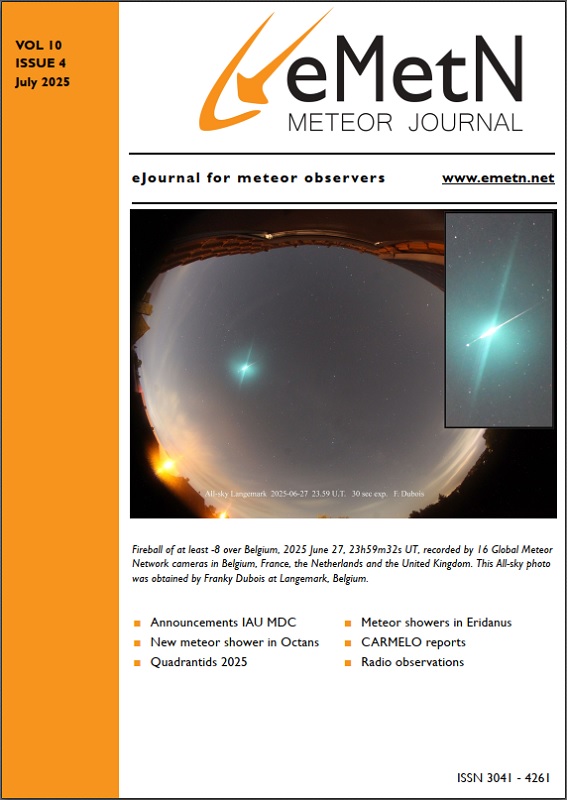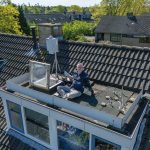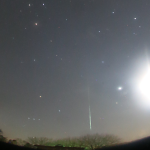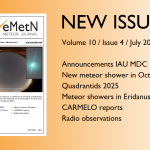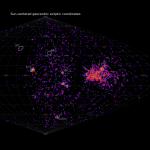Here’s the second half of my 2019 Perseids meteor observing campaign. Most of the Perseid action occurs every year on or near August 12, but I have always enjoyed following the rising and declining stages of all the meteor showers. This period can last anywhere from a few hours in the case of some showers with little or no background activity, to several weeks when it comes to the old, well established ones (such as the Perseids).
This summer, I’ve had the fortune of being out for multiple clear nights (late July to mid August). The waxing moon phase meant that most of my sessions approaching the peak were held late at night after moonset. Sometimes, the sky cleared after midnight as well. These late nights were actually ideal timing due to the rising radiant, but at times, I will admit that it was a bit difficult with my sleep patterns 😉
On the evening of August 10, I joined Raymond Dubois to observe at Shane Finnigan’s beautiful property near Renfrew (about 90km west of Ottawa). Raymond did a full “dry run” setup to test some new accessories for the upcoming Mercury transit. As I waited for the Moon to go down, I spent the evening with Shane and Raymond. The sky was surprisingly crisp even with the 10 days old gibbous moon up in the south. Shane and I took a walk and we saw a nice -3 KCG heading down slowly in the east and fragmenting before it faded away!
I signed-on at 1:30am EDT, about half an hour before moonset. The sky gradually darkened as the Moon descended, the Milky Way became more structured and the meteor rates increased. It’s really neat seeing so many faint stars quickly appear in a dark sky site at moonset! Some cirrus clouds were present occasionally but did not affect the viewing, and the sky was quite transparent (LM=6.4).
I observed for almost 2.71 hours, and saw 67 meteors (47 Perseids, 7 South Delta Aquariids, 2 Kappa Cygnids, 1 alpha Capricornid, 1 eta Eridanids and 9 sporadics). The Perseids dominated with hourly rates of up to 20/hr.
For most of the night, the Perseids appeared to be more on the faint side. That was until 2:36am when a blue-green -4 PER fireball flared near the radiant and left an 8 sec persistent train! This prompted Raymond and I to quickly setup our cameras. Just a few minutes later while on break, another -4 PER was seen, descending in the north with a 12 sec train! I opted to use a 24mm lens, and aim the camera to the west, unguided (just camera on tripod) using short 15 sec exposures at ISO6400. All the meteors captured in the span of 1.5 hours were then combined together to form this composite image:

I also saw a few meteors that could be possible Beta Perseids (BPE) but I officially counted them as sporadics. The rates for sporadics was lower than expected on this night.
I finished at 4:35am just as the morning twilight started, and a band of cirrus clouds formed. It was a cool night, down to just a few degrees!
Observation August 10/11 2019, 05:30-08:35 UT (01:30-04:35 EDT)
Location: Renfrew, Ontario, Canada
(45°25’48″N 76°38’24″W)
Observed showers:
kappa Cygnids (KCG) – 18:56 (284) +49
alpha Capricornids (CAP) – 21:05 (316) -07
Anthelion (ANT) – 22:04 (331) -12
Northern delta Aquariids (NDA) – 22:58 (344) +01
Southern Delta Aquariids (SDA) – 23:27 (352) -12
Piscids Austrinids (PAU) – 23:41 (355) -19
Perseids (PER) – 03:01 (045) +57
eta Eridanids (ERI) – 02:56 (044) -12
05:30-06:37 UT (01:30-02:37 EDT); clear; 3/5 trans; F 1.00; LM 6.22; facing SE60 deg; teff 1.11 hr; temp 8C
PER: twenty: -4; 0; +1(2); +2(8); +3(3); +4(3); +5(2)
SDA: two: +1; +5
ERI: one: +3
Sporadics: four: +3; +4; +5(2)
Total meteors: Twenty-seven
06:59-07:59 UT (02:59-03:59 EDT); clear; 3/5 trans; F 1.00; LM 6.43; facing SE50 deg; teff 1.00 hr; temp 5C
PER: seventeen: -1; +1; +2(3); +3(6); +4(4); +5(2)
SDA: two: +3; +5
KCG: two: +1; +4
Sporadics: three: +3; +4(2)
Total meteors: Twenty-four
07:59-08:35 UT (03:59-04:35 EDT); clear; 3/5 trans; F 1.00; LM 6.12; facing SE50 deg; teff 0.60 hr; temp 4C
PER: ten: +1(2); +2(3); +3; +4(2); +5(2)
SDA: three: +1; +4(2)
CAP: one: +1
Sporadics: two: -1; 0
Total meteors: Sixteen
Clear skies,
Pierre Martin
Ottawa, Ontario

